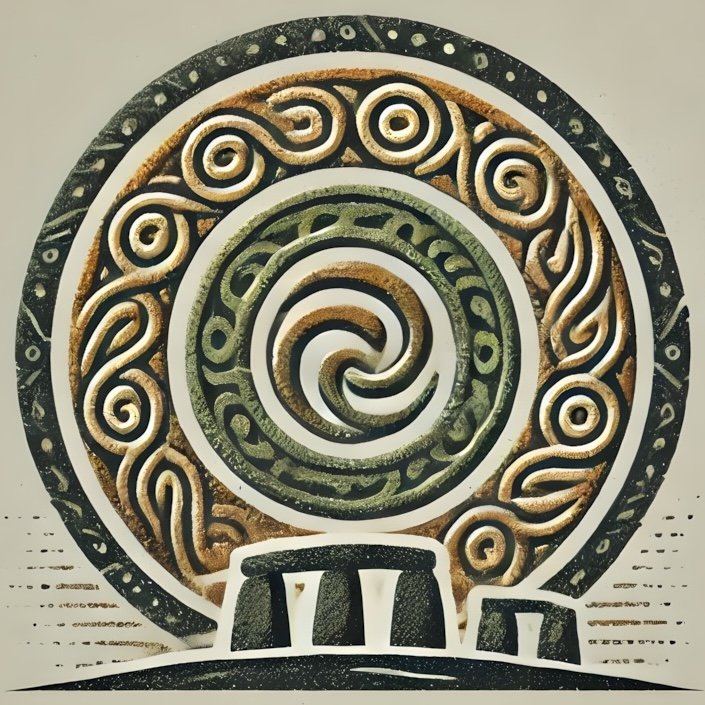The Role of Music in Pre-Christian Irish Society
Introduction
In the tapestry of pre-Christian Irish society, music was not merely an art form; it was a vital thread woven into the very fabric of daily life, spirituality, and social structure. The significance of music transcended entertainment, serving as a powerful medium for communication, storytelling, and ritual. This pillar page explores the multifaceted role of music in pre-Christian Ireland, particularly its cultural significance in warfare and power, while also delving into its broader implications in social cohesion, spirituality, and identity.
Music as a Tool of Warfare
Music in pre-Christian Ireland held a unique place in the context of warfare. The sounds of the battlefield were often accompanied by the resonant notes of horns, drums, and other instruments, which served to rally troops, intimidate foes, and mark the rhythm of battle. The use of music in this context was not merely functional; it was deeply symbolic, embodying the spirit of the warriors and the ethos of the clans.
The War Horns and Battle Cries
War horns, known as cenn or tromp, were pivotal in ancient Irish warfare. Their piercing sounds could be heard across the fields of conflict, signaling the onset of battle and instilling a sense of urgency and courage among warriors. The use of such instruments was steeped in tradition, often accompanied by chants or battle cries that invoked the names of ancestors or deities, thereby linking the warriors to a lineage of valor and strength.
Music as Psychological Warfare
Beyond its role in rallying troops, music also served as a form of psychological warfare. The haunting melodies of lamentation or the fierce rhythms of battle songs could instill fear in the hearts of enemies. The Irish were known for their poetic prowess, and songs that recounted the bravery of warriors or the tragedies of fallen heroes could demoralize opposing forces, making them question their own resolve. This interplay of music and warfare illustrates the profound understanding of the psychological dimensions of conflict in pre-Christian Irish society.
The Bardic Tradition and Storytelling
At the heart of pre-Christian Irish society was the bardic tradition, a rich tapestry of oral storytelling, poetry, and music. Bards were not merely entertainers; they were custodians of history, culture, and social values. Their role extended beyond the performance of songs; they were influential figures who shaped public opinion and preserved the collective memory of the people.
The Role of Bards in Society
Bards were often associated with the ruling classes, serving as advisors and chroniclers of their deeds. Their songs celebrated victories, commemorated the dead, and recounted the lineage of kings and heroes. Through their art, bards reinforced the social hierarchy and the legitimacy of power, intertwining music with the very notion of governance. The bardic tradition was thus a means of maintaining social cohesion, as well as a vehicle for political commentary.
The Power of Song in Identity Formation
In a society where oral tradition reigned supreme, music was instrumental in shaping cultural identity. Songs that recounted the myths of the Tuatha Dé Danann or the exploits of legendary heroes like Cú Chulainn served to forge a collective identity among the Irish people. These narratives, often imbued with moral lessons, provided a sense of belonging and continuity, linking individuals to their ancestors and the land itself.
Spirituality and the Sacred
Music in pre-Christian Ireland was intrinsically linked to spirituality and the sacred. The Irish landscape, dotted with ancient stone circles, burial mounds, and sacred sites, served as a backdrop for musical rituals that connected the earthly realm with the divine.
Ritual Music and Ceremonies
Rituals often incorporated music as a means of invoking the presence of deities and ancestors. The sounds of flutes, harps, and drums accompanied ceremonies that marked significant life events, such as births, marriages, and funerals. These musical expressions were believed to facilitate communication with the Otherworld, allowing individuals to seek guidance, blessings, or solace.
Music as a Medium for the Divine
In pre-Christian Irish belief systems, music was seen as a divine gift. The harp, in particular, held a sacred status, often associated with the goddess Brigid and the concept of inspiration. The act of playing music was perceived as a way to channel the divine, allowing the musician to transcend the mundane and connect with higher realms. This connection between music and spirituality underscores the belief that sound could evoke emotional and transformative experiences, bridging the gap between the human and the divine.
The Role of Music in Social Cohesion
Beyond its military and spiritual dimensions, music played a crucial role in fostering social cohesion within pre-Christian Irish communities. Gatherings, feasts, and festivals were often characterized by communal music-making, where individuals came together to celebrate, mourn, or simply enjoy each other’s company.
The Importance of Communal Gatherings
Communal gatherings provided an opportunity for the sharing of songs and stories, reinforcing social bonds and cultural identity. These events were not only occasions for entertainment; they were essential for the transmission of knowledge, values, and traditions. Through music, the collective memory of the community was preserved, ensuring that the stories of ancestors and the lessons of the past were passed down through generations.
Music as a Means of Conflict Resolution
In a society where disputes were often settled through negotiation rather than violence, music played a role in mediating conflicts. Songs that recounted grievances or celebrated reconciliation could serve as a means of restoring harmony within the community. The act of coming together to sing could diffuse tensions and foster understanding, highlighting the power of music as a tool for peace.
Conclusion
The role of music in pre-Christian Irish society was multifaceted and deeply embedded in the cultural, spiritual, and social fabric of the time. From its significance in warfare and power to its role in storytelling and spirituality, music served as a vital conduit for expression, identity, and community cohesion. As we explore the rich tapestry of Irish prehistory, it becomes evident that music was not merely an accompaniment to life but a central force that shaped the very essence of existence in ancient Ireland.

